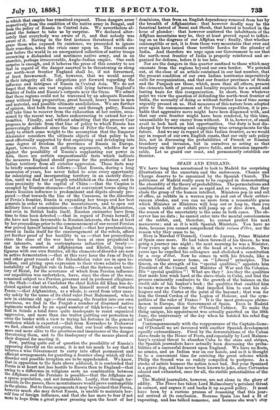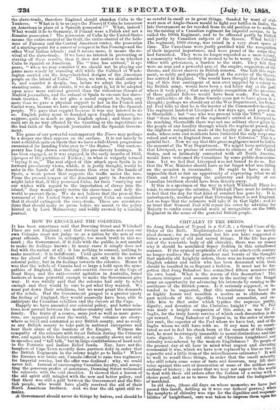SPAIN AND ENGLAND
WE have long been accustomed to look to Madrid for surprising illustrations of the uncertain and the unforeseen. Chance and Change deserve to be canonized by the Spanish Church. The politicans of Madrid really seem to be engaged in demonstrating the absurdity of the theory of probabilities. The permutations and combinations of factions are so rapid and so various, that they elude the grasp of the human intellect. Ministers pop in and out of office, as rabbits in a warren pop in and out of their subter- ranean abodes, and you can no more form a reasonable guess which Minister or Ministers will leap out or leap in, than you can which rabbit or rabbits will jump up or dive down. And the reason of the uncertainty is the same in both cases. The ob- server has no data ; he cannot enter into the mental consciousness of the rabbit, and, therefore, he cannot predict his next manoeuvre; and so it is with Spanish Ministers. You have no data, because you cannot comprehend their raison d'être, nor the reason why they cease to be.
Here is Marshal O'Donnell, Count de Lucena, Prime Minister of Spain once more. He had taken farewell of his Queen he was going a journey one night ; the next morning he was a kinister. Four years ago he came in at the head of a revolution. Two years ago he expelled his colleagues and abolished a constitution by a coup d'etat. Now he comes in with his friends, like a certain Cabinet nearer home, on "Liberal" principles. The Queen, on the strength of his " special qualities," appoints him President of the Council and Minister of War and the Colonies. His " special qualities " What are they ? Are they the qualities that made him wink hard at the slave-trade in Cuba, and find the process eminently conducive to the growth of the balance on the credit side of his banker's book ; the qualities that enabled him to make war on the Crown ; that impelled him to oust his col- leagues and the Cortes at the point of the bayonet ; that won for him the Grand Cordon of the Legion of Honour, and the sym- pathies of the ruler of France ? It is the most grotesque pheno- menon in Europe, this Government of Spain. Even in Madrid they cannot account for the O'Donnell Cabinet. To make the thing unique, his appointment was actually gazetted on the 30th June, the anniversary of the day when he hoisted his rebel flag at Vicalvaro
Contemporaneously with the reappearance of the Captain-Gene- ral O'Donnell we are favoured with another Spanish development equally extraordinary. Fired by the denunciations of the Cuban slave-trade in the House of Peers, and especially by Lord Malmes- bury's cynical threat to abandon Cuba to the stars and stripes, the Spanish journalists have actually been discussing the proba- bilities of a successful descent upon England. We have no fleets, no armies, and an Indian war on our hands, and so it is thought to be a convenient time for reviving the great scheme which Philip the Second was so rudely compelled to postpone. As a stroke of satiric humour the notion is not bad. But your Spaniard is a grave dog, and has never been known to joke, since Cervantes educed and exhausted, once for all, the risible potentialities of the nation.
The Madrid journalists, however, are not alone in the glory of oddity. The Times has Lken Lord Malmesbury's petulant threat in earnest, and argues it and backs it up as good policy. It must have been by a curious process of reasoning that this jour- nal arrived at its conclusion. Because Spam has had a fit of vapouring, and has talked nonsense, and because she won't stop the slave-trade, therefore England should abandon Cuba to the Yankees. " What is it to us (says the Times) if Cuba be tomorrow an American in place of a Spanish possession ?" What, indeed ! What would. it be to Germany, if Poland were a Polish and not a .Russian possession ? The possession of Cuba by the United States -means the entire control of the Gulf, the entire control of the Isth- mus of Panama and the Central American routes, the possession of a starting-point for a career of conquest in San Domingo and the other West Indian islands ; and it means more, it means the re- _-vivtal of the slave-trade. If we have no interest in preventing or staving off these results, then it does not matter to us whether Cuba be Spanish or American. The " time has arrived," it ap- Tears, " when we may consider if we should not be playing our same more wisely by standing still while the Cabinet of Wash- ington carried out the long-cherished designs of the American people on the island of Cuba." Then, we trust, we shall consider it, and consider it deeply, too, before we adopt the policy of standing aside. At all events, it we do adopt it, let it be adopted upon some more rational ground than the ridiculous threats of Madrid journalists, and the refusal of Spain to execute her slave- trade treaties. We do not give a moral support to Spain, any more than we gave a physical support to her in the French and Carlist wars, because we have any special affection for the Spanish people. We gave that support because it was our interest to do so. English policy must be founded upon English interests, we suppose, quite as much as upon English spleen ; and those inte- rests are in no way affected by the vaunting or the ingratitude or the bad faith of the Spanish journalist and the Spanish Govern- xnent.
The game of our powerful contemporary the Times may perhaps be a deeper one than appears on the surface. It is not merely to vent a childish spite on Spain that we have a full-blown programme enunciated for handing Cuba over to " the States." Our contem- porary has long shown something like pro-slavery leanings. It has been engaged, as it was engaged in the early months of 1853, (dpropos of the partition of Turkey,) in what is vulgarly termed "trying it on." The real object of this attack upon Spain is to forward pro-slavery views, which, it is justly thought, would be safer in the hands of the Americans than even in the hands of Spain, a weak power that supports the traffic under the rose. From the present temper of the dominant party in America we might infer that, if they possessed Cuba, far from " carrying out our wishes with regard to the importation of slaves into the island," they would openly revive the slave-trade and defy the world to prevent them. We do not believe that the present Go- vernment of the United States would accept Cuba on condition that it should extinguish the slave-trade. These are considera- tions that should make us pause before we assent to the policy hinted at by Lord Malmesbury and boldly avowed by a leading journal.



























 Previous page
Previous page